Close Combat 4 : Battle of the Bulge
Real time wargame reviewed
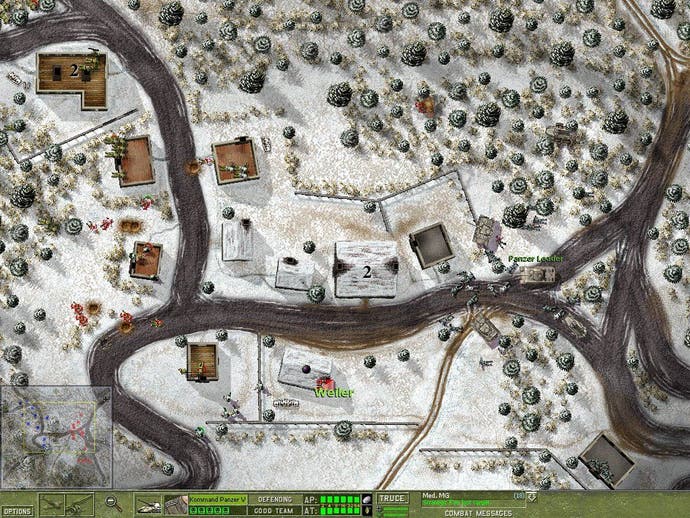
Bulging
The Battle Of The Bulge was the desperate attempt by Hitler to defeat the advancing Allied forces near the end of the war. The Allies had by then regained most of Europe, and were beginning to engage the retreating German army on their own soil.
The confident American troops stationed in the Ardennes where completely unprepared for any kind of aggressive action, and were taken by surprise by a massive German strike force which vastly outnumbered them. This successful German strike drove the Allied forces back and came to form a large pocket of German territory inside the allied lines, the so called Bulge.
Close Combat IV: The Battle of the Bulge gives you the choice of fighting this epic struggle from either side. As the Allies your objective is to contain the German invasion and hold fast for the incoming reinforcements to arrive. The German objective is to continue the momentum forward and break through the Allied defenses.
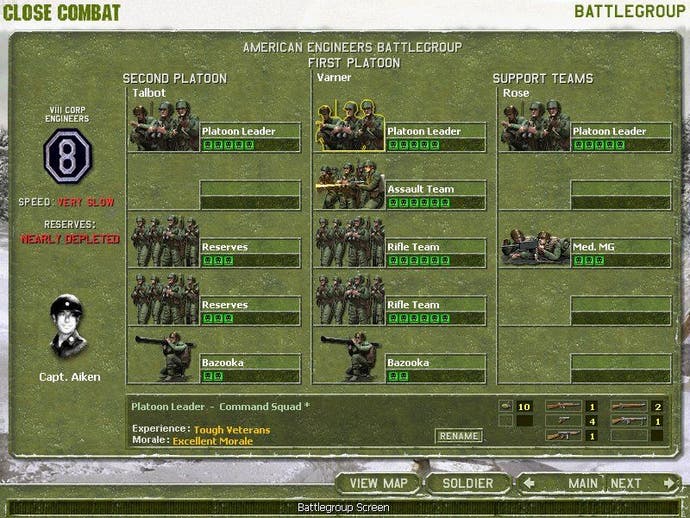
Authentic
This is a real time strategy game, but unlike most such games, the Close Combat series emphasises realism and authenticity. This is no fantasy war - the battles are based on actual historical conflicts, and the longer campaigns in Close Combat IV are taken from the real situation in the Ardennes during the final months of the Second World War.
More importantly, the authenticity also extends to the troops under your control as the overall commander. The men have feelings that must be taken into consideration as you plan your conflicts - if they are tired they won't be able to run, if they feel scared they will hide.
This makes it impossible to use the tank rush "strategies" that are common in less realistic games like the Command & Conquer series, as if you throw your men repeatedly to the slaughter they will quickly realise the folly in your tactics and run for their lives. This throws the emphasis more on planning safe and successful attacks rather than resource management, and makes for a highly intense strategic experience.
From the opening menu you are given the choice of tutorial missions, a single battle and operations, a more involved long term campaign mode, and a multiplayer option.
The tutorial boot-camps are effective at teaching you the simple point and click interface, and go on to teach some basic strategy techniques together with some hints on the best use of the units available in battle. They only scratch the surface however - there is a massive range of units and tactics supplied, so reading the sixty page manual is essential if you are to become a successful commander.
The single battles are fun recreations of actual scenarios, albeit with the actual numbers of men involved reduced to fit with the squad based game engine. There's also about a dozen or so operations available for when you tire of the single battles. These have an objective set across a number of battles, but this is really just an introduction to the meat of the game, the fabulous campaign mode.
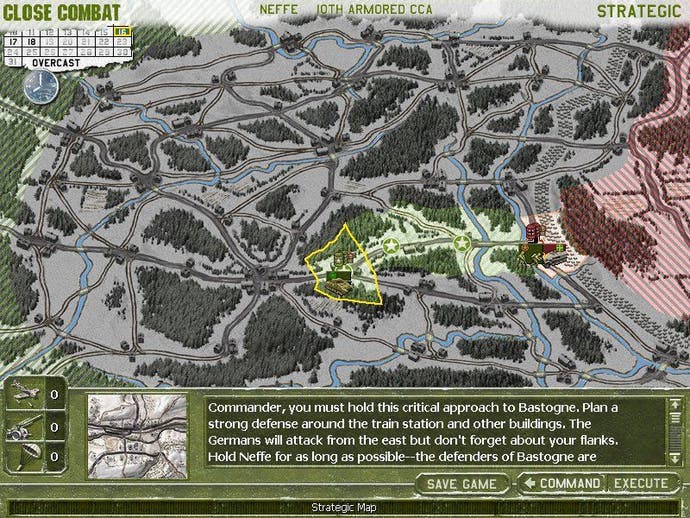
Campaign
This section of the game puts you not only in control of the actual skirmishes, but also makes you responsible for the overall direction of the fight for the Bulge.
Most of this management is completed on the campaign map, a representation of the Ardennes area broken up into strategic sections that represent each battle map. Consideration must be given not only for your advancing position, but also your supply and transportation system. Key strategic positions for chain of supply such as crossroads are vitally important, and must be protected at all costs.
Battles on the strategic map are turn based - you complete each of the outstanding fights in sequence, the game takes a turn, and you get a picture of the overall impact of each of your skirmishes. It's a very well thought out system, and gives you a real feeling that you're influencing the outcome of the campaign with each battle won or lost.
The actual battles themselves are incredibly intense and exciting. The realistic theme is continued throughout, and the enemy can only be spotted and targeted when in the line of sight of your units, so you must attempt to anticipate the position and tactics of the enemy. A long and considered attack on a farmhouse involving several precious units could reveal it to be empty of enemy forces, but you won't really know until the strike is complete.
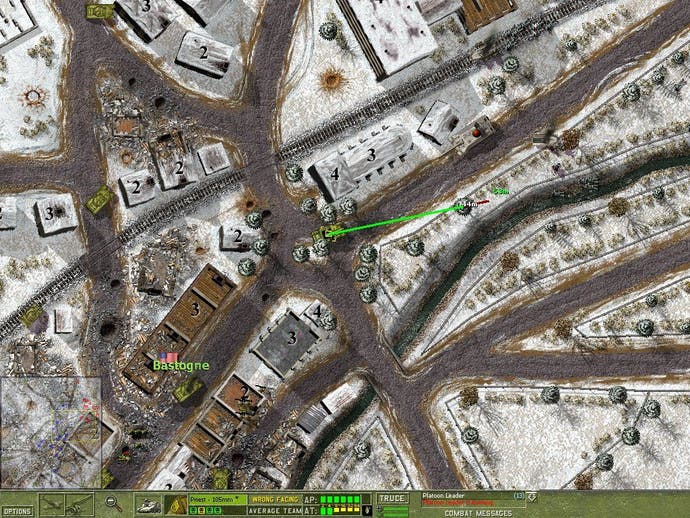
TLC
Extreme care must be taken to protect your units as they advance, so there are plenty of options for conducting tactical movements.
Smoke can be used by both armored units and infantry to make advancing under enemy fire safer. Several types of movement are available, ranging from fast and careless running, to very slow and alert sneaking. Standard military tactics such as suppressive fire and flanking are vitally important for a successful battle.
The artificial intelligence of your troops is such that should things go pear shaped, they will try their hardest to keep themselves alive until you can issue new orders. This impressive intelligence also makes life very difficult, as if you foolishly leave a unit exposed to enemy attack it will be eliminated very quickly.
There are a few annoying faults unfortunately. The visuals aren't spectacular but they represent the battles clearly, although after several battles on the same area the scene becomes cluttered and confused.
The attacking AI of the computer controlled side seems a bit dimmer than when it's defending, and the pathing on the maps can occasionally frustrate you, especially with the tanks and armored units. None of these problems renders the game unplayable though, and with long term play you come to learn these faults and plan around them.
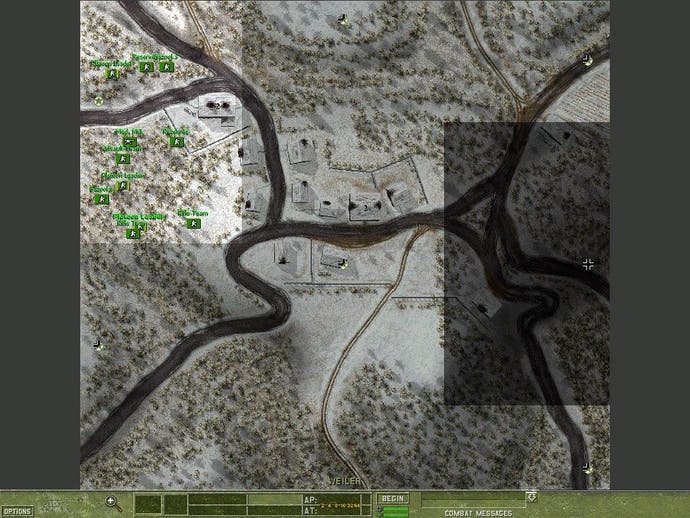
Conclusion
Fans of the Close Combat series will lap this game up, and it's a very worthy follow-up to it's popular predecessors. Strategists new to the series should definitely give Close Combat IV a try too - the extra realism makes for a very refreshing change from other RTS titles, although it has to be said it makes the game a lot more challenging.
Give it a go if you think you're hard enough.
